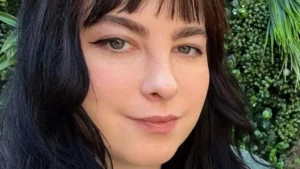Doctor strike inflicting pain and misery on patients, says health secretary
Health Secretary Wes Streeting says the five-day strike by resident doctors is “completely irresponsible”.
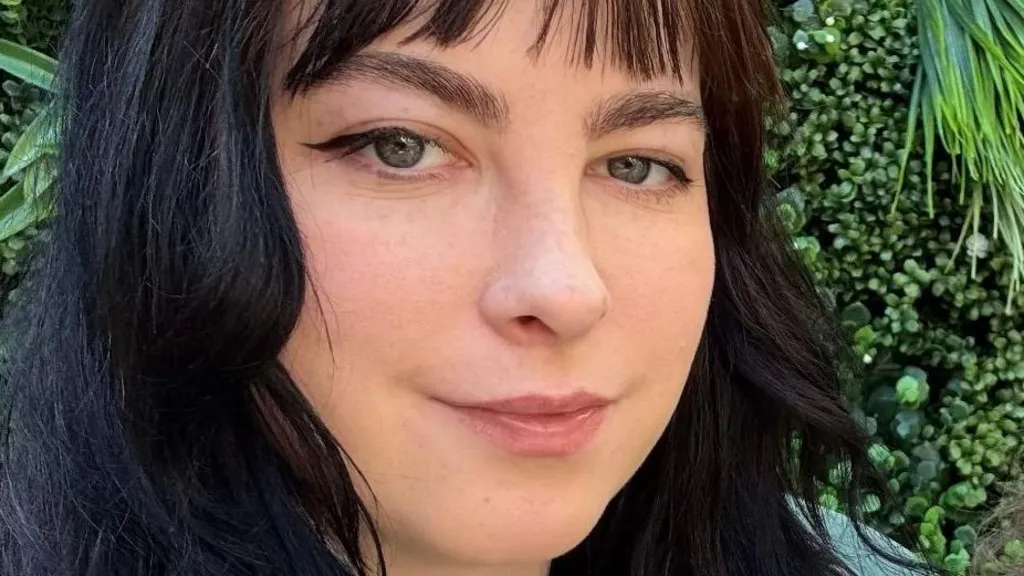
Nick TriggleHealth correspondent
Doctors going on strike again over pay is “inflicting pain and misery” on patients, says Health Secretary Wes Streeting.
“We could do without this reckless action,” he said, adding it could harm patients.
The five-day walkout in England by resident doctors, the new name for junior doctors, runs until 07:00 GMT on Wednesday.
The doctors’ union – the British Medical Association (BMA) – says they are still not paid enough and there are too few training places or jobs.
The NHS says nearly all services will keep running, and patients should attend appointments unless advised otherwise. Hospitals will come under the most strain – resident doctors make up about half their medical workforce.
NHS England says it wants to keep 95% of non-urgent work, such as hip and knee operations, going by re-deploying and offering overtime to consultants and other senior doctors as well as relying on those not striking. Around a third of resident doctors are not BMA members and will be working.
But this will come at significant cost, with the NHS estimating the five-day walkout is costing £240m to cover.
‘Heartbreaking cancellation’
 Chloe Rogers
Chloe RogersDespite the attempt to keep services going, Chloe Rogers, who is 23 and from Nottingham, has had her urgent appointment for a scan cancelled.
Chloe says she got the news by text, with no new date given.
Chloe had a private MRI scan two months ago, which showed signs of endometriosis on her bowel and ovaries. This means tissue similar to the womb lining is growing around these organs. She said some of these signs are “worrying”.
The appointment was to “figure out the next steps” in her medical care, she says.
“When I read the text, I was honestly heartbroken and this isn’t the first appointment of mine that’s been cancelled or delayed,” Chloe told Your Voice, Your BBC News.
“This is something that affects the quality of my life. This has been going on for two years now. These strikes affect the quality of people’s lives.”
‘Reliant on consultants’
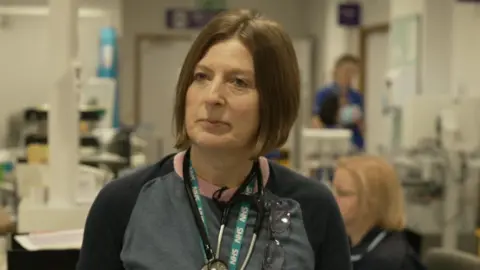 BBC News
BBC NewsDr Vicky Alner, a consultant in geriatric medicine at Milton Keynes University Hospital, says her ward round has taken her a lot longer than normal today because of the doctors’ strike.
Some resident doctors have observed the strike at her hospital, but others have come in. She says there’s a safe level of staffing on all wards, but it’s just less efficient and everything is moving more slowly than usual.
“The main thing is to keep our patients safe,” Dr Alner says.
“Normally we’d have four resident doctors per ward and we may have one or zero now. And we’re reliant on the consultants to see everybody. But everybody’s clubbed together so we have all our emergency rotas covered,” she said.
Pay dispute
NHS England medical director Prof Meghana Pandit said it was frustrating and disappointing that another round – the 13th – of industrial action was taking place, at a challenging time for the NHS, with cases of flu rising earlier in the autumn than usual.
“Despite this, staff across the NHS are working extremely hard to maintain care and limit disruption,” she added.
But BMA leader Dr Tom Dolphin said keeping most services running would be “challenging”.
He said doctors had a legal right to strike and should not be “bullied or coerced” into working.
And he warned his members would only leave the picket line if there was a major emergency – such as a mass casualty event.
He said the BMA had “reached an impasse” with the government over pay and jobs.
“We’ve got pay that is still a fifth down on the value that it had in 2008,” he said, adding there are “thousands of doctors who are unable to get into training posts, are unable to become the specialists and the GPs of the future that we need”.
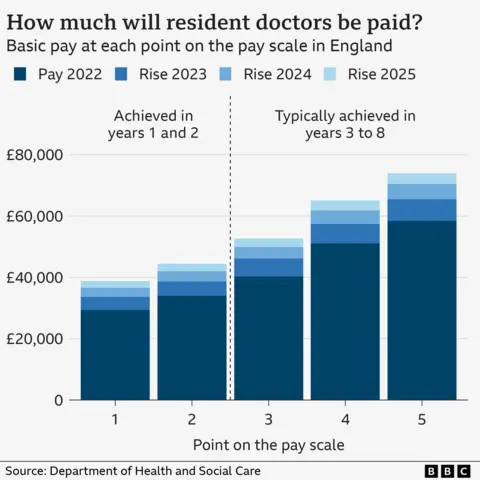
On the picket line
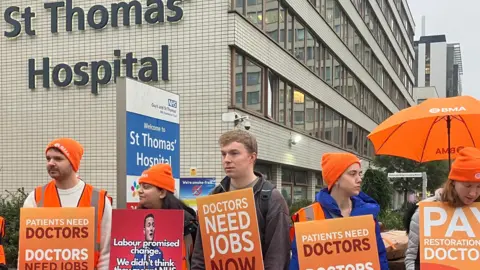 BBC News
BBC NewsResident doctor Arthur Joustra was on the picket line outside St Thomas’ Hospital in London.
He said he was fighting for a properly funded NHS where people can excel their careers, train correctly, and ultimately give the best standard of patient care possible.
“Why should we be paid less than we were in 2008 for doing what is arguably harder?” he told the BBC.
“This is not just in the interest of doctors. This is in the interest of the NHS, the public and ultimately, the patients.”
The latest walkout comes after Health Secretary Wes Streeting launched arguably his strongest attack on the BMA.
Addressing a conference of health managers this week, he called the union “morally reprehensible” and accused it of acting like a cartel, attempting to hold the public and government to ransom.
He said doctors had received generous pay rises over the past three years – worth nearly 30%, bringing average basic salaries to just over £54,000.
Talks between Streeting and the union broke down last week after the BMA turned down a fresh offer to end the dispute.
The health secretary has maintained throughout the year that he could not negotiate on pay, but he proposed a deal that would see out-of-pocket expenses like exam fees and membership fees covered, along with a boost in speciality training places.
But the BMA has argued that, despite the pay rises, resident doctors’ pay is still a fifth lower than it was in 2008, once inflation is taken into account.
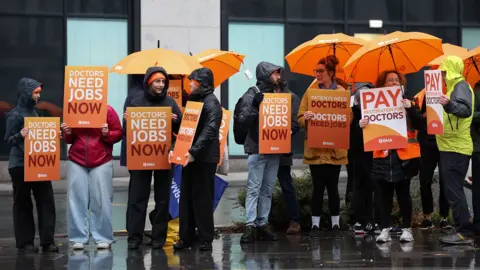 EPA
EPAThe union has also warned doctors are struggling to find jobs at a key stage of their training – between years two and three when they start speciality training.
This year there were more than 30,000 applicants for 10,000 jobs at this stage, although some will have been doctors from abroad.
The BMA says it wants to negotiate. Dr Dolphin said: “We want a settlement to this. We don’t want to be on strike. We’d much rather be looking after the patients.”
Meanwhile, resident doctors in Scotland are balloting for strike action over pay.
Additional reporting by Kris Bramwell, Philippa Roxby and Michelle Roberts.






